For those who live in areas that are considered Hurricane Zones, you need to be aware of the potential dangers that you face during a hurricane. Far too many people ignore the threat, oddly believing it won’t affect them even though they live directly in the danger zone.

Hurricanes should never be taken lightly. Even when downgraded to a tropical storm, the intense rain and winds generated by these storm systems can still be enough to cause major problems and large-scale damage throughout major portions of the country. From downed power lines and flash flooding to building damage and the loss of essential services, the initial storm surge can cause a number of problems that you need to be prepared for.
If you plan on staying in the area or have stayed beyond the period where you can safely evacuate, you need to be prepared to survive in your home for at least 14 days without food, water, or power. The government often recommends that you need at least 72 hours’ worth of supplies, but based on past storms this number is nowhere near what you should prepare for. These numbers are grossly underestimated, and put together by people who continually screw up when things go bad — you can not count on the government during times of crisis!
Hurricane Classifications and Damage Estimates
Hurricanes are classified based on their wind speed and given a ranking of 1 to 5 on The Saffir-Simpson Hurricane Wind Scale. Hurricanes reaching Category 3 in strength are considered major hurricanes because of their potential for significant loss of life and damage to infrastructure and property.
While Category 1 and 2 don’t cause as much damage, they are still incredibly dangerous and have the potential to kill. So while these scales give you an idea of what to expect, storms are very hard to predict and things can often change in a matter of hours.
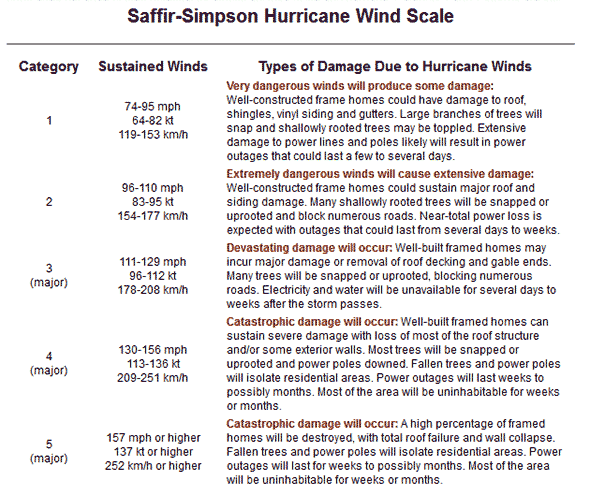
Hurricane Supples to Stock up on that can Help you Survive
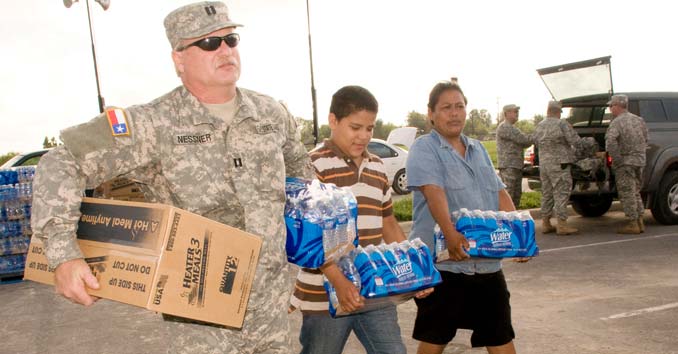
What you stock is going to depend on your unique needs; for instance, someone with medical problems is going to have a whole list of products that they may need that the average person would do just fine without. That being said, there are some general emergency preparedness items that everyone should consider stockpiling.
- Think about what things you would take on a camping trip, one where you had no access to power or water. These are the type of things that you’ll want to stock up on because there’s a good chance you’ll probably be camping out in your home for at least a couple of days following the storm.
- Lighting the way. Candles, lanterns, and flashlights are all essential during a hurricane. Make sure you have a number of them on hand and don’t forget to stock up on extra batteries.
- Generator – If you can afford one, a generator sure makes things a lot easier during a power outage. Just remember to keep it away from your home and away from windows so the dangerous exhaust fumes don’t blow back into your house.
- Canned Food – Having canned food that can be eaten right out of the can is always a good idea. Not only can it be eaten without cooking, but it can make life easier and give you less to worry about after a storm. Just make sure to have a couple can openers on hand, or buy cans with easy open pop tops.
Hurricane Preparedness – Tips to survive a hurricane
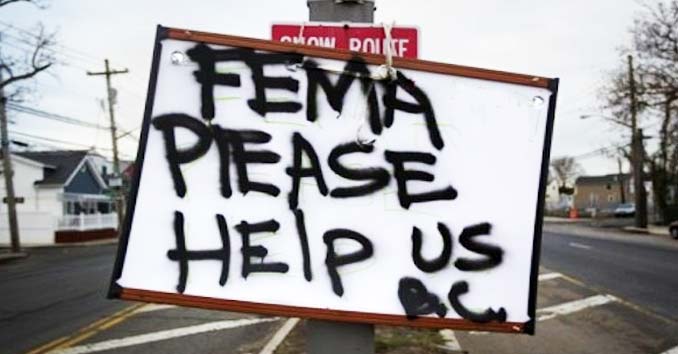
Disaster after disaster shows us just how unprepared the government is to respond to any sort of crisis. The reality is that even after the colossal government failures in responding to Hurricane Sandy and Katrina, very little has changed in the way FEMA responds to these disasters.
From the major failures in how the government responded to the Gulf Oil Spill to the criminally neglectful way the government responded to the Flooding in Louisiana in 2016, our nation’s emergency preparedness managers continue to fall short in terms of planning for catastrophic disaster response and rescue.
Learning lessons from these massive government failures, the public needs to understand that they are on their own; they need to start preparing for the next major disaster.
- If you can evacuate, you probably should go. In my opinion, no amount of stuff is worth losing your life. In the case of a major hurricane, it’s often best to listen to evacuation warnings, especially if you live in an area that’s prone to flooding. And don’t wait until the last-minute, or you could end up stuck in traffic on the highway when the storm hits.
- If you’re planning on hunkering down, you need to have enough supplies to survive 14 days without food, water, or power.
- During the storm, take shelter in a small interior room, closets, or areas without windows — preferably on the lower levels of your home.
- The higher you are during the storm, the worse the winds will become. If you live in a high-rise building, you need to find somewhere else to go.
- If you can, try to secure your home by boarding up windows with at least 5/8 inch marine grade plywood.
- Secure everything that’s outside your home that could turn into a dangerous projectile during the storm. Strap down, or bring in any anything that you don’t want to fly away.
- If you expect major flooding it might be a good idea to temporarily turn off your utilities at the main switches or valves.
- If you don’t have a large amount of water on hand, fill up as many containers as you can before the storm hits. Tap water usually becomes unsafe after major storms, so you’ll want to have as much water on hand as you can store. Pots, pans, and even your bathtub can be a great way to store extra water.
- Beware of the calm in the middle of the storm. A lot of people get into trouble because they drop their guard when it seems like things have calmed down. Remember, when the eye of the storm is overhead it can look like the storm has passed. In reality, there’s more to come; and what’s coming can often be worse than what’s already passed.
After the Storm: The Post-Hurricane Danger that can Still Kill
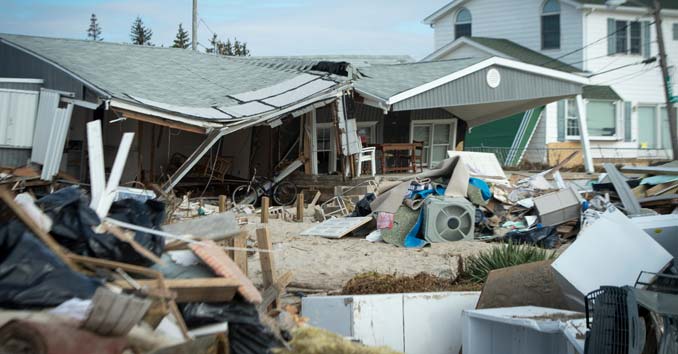
- Avoid floodwater. Floodwater often contains things that are hazardous to your health. From raw sewage to oil, gasoline and other potential dangers like downed power lines, the last thing you want to do is go walking through floodwater.
- Be on the lookout for looters or anyone who looks like they should not be in your neighborhood. Natural disasters can often bring out people who are looking for easy opportunities to rob and steal, so make sure you’re ready to defend your home and your family.
- Monitor your weather radio or emergency radio. Make sure you monitor the situation so you know if things are getting better or worse. Knowledge is power, so make sure you know what’s going on around you.
- Just because the hurricane passes don’t assume that the dangers have passed. From looters to floodwater, your troubles may have just begun. Don’t let your guard down just yet.


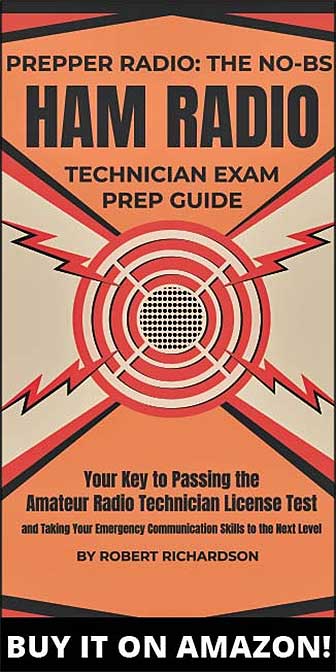
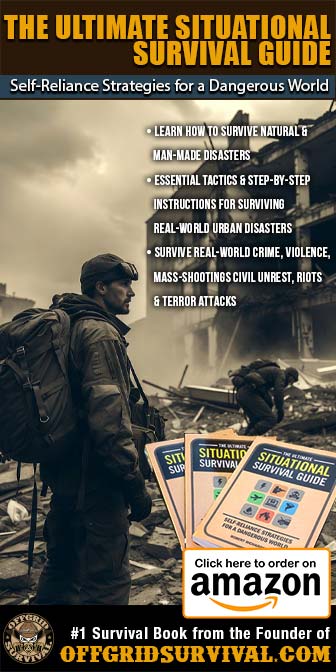


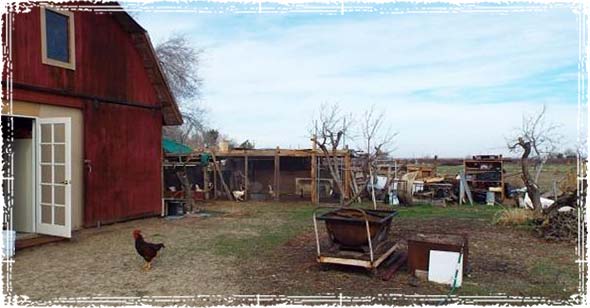
I might warn readers about stocking up on candles, especially as a first resort for lighting. Candles are a MAJOR cause of fire after disasters. Considering there are safer alternatives (such as battery-powered LED lanterns) I would only bother with candles if I had no other choice.
Thanks, I’m hunkering down. I’m a little in land by 30 miles. but 15 miles to the bay.
One of the best things i have found is the cheap outdoor solar lights. i have about a dozen in my preps. they are cheap light weight can be charged many times, and firesafe. i use them when the power goes out much like you would candles. couple of hours outside. (even in low light) and they are good for most of the night.
Hurricane Irene’s winds were 70 miles per hour. Enough to cause tree damage. The downed trees created broken power lines, electrified puddles, crushed automobiles, damaged homes, and a lot of flooding. New Jersey and Vermont were the hardest hit eastern states. Many roads are now flooded so travel is a real pain. Many people were flooded out of their homes and had to use shelters. We had gone without power for four days some years ago, in July (a substation problem), so we lost all our food. This was an important lesson learned the hard way. This time we were ready with our water making machine, battery backup, and food supplies.
if they say you must go to a shelter tell them you are safer out in the elements.we were forced into a shelter in canton tx. after hurricane ike. and i do mean forced.we were herded around by national guardsmen with rifels like pow,s they would not lrt us leave till they decided it was safe.the bathrooms were backed up and people were useing bthe corners of rooms for toilets.they had little or no food and very little water.i was handcuffed and held for two hours because i admitted (when asked)that i had an unloaded handgun in my bag.people were robbed one woman was attacked for not moving out of a mans way so he could sit down.the smell and crush of people was much worse than the rain and wind would have been.all of this took place while twenty or thirty cops and guardsmen sat outside the doors and smoked. never never go to a shelter. stay in a car,a drain culvert,a partly destroyed building,under a tree or any where that you can but stay out of public shelters! i later complained to the govener,s office (rick perry) about our treatment and was told rather rudely that it was a fema matter and hung up on. if i had it to do over again i would have hidden from the would be rescuers.we were also not allowed to return to bolivar for two weeks.what there was left was stolen by looters or ruined by the elements.do i sound bitter? wonder why.
Hey great info…I live in nyc on the 8th floor, I looking for a way to protect my windows from the high winds in the event of….any ideas…….I’m thinkin if I had to stay. I would have to do it from the inside, thanks
To Jimmy on Sun, 4th – Sears sells thick,insulated draperies. Get some that are oversized for your windows. Place some heavy items on the extra drape on the floor. This will help shield you from flying glass if the window shatters. Remember to clear things off the roof before the storm.
Wow, great info – I was in Japan 9.0 quake. Glad I brought some preps with me since I had to stay for a week after it happened before I could fly out. Thanks for the info – especially on FEMA shelter. One of my good friends was a contractor during Katrina – those shelters are ugly.
Flameless candles make good night lights so it is not completely dark if you or a child wakes but lanterns and flashlights are better when you are up and around.
If you have propane and the electricity goes out, keep long metal flame to light the burners on your stove.
If you expect to be without electricity, figure on emptying your refrigerator and freezer before hand. Ice cream will melt and make a sticky mess. Once emptied, you can use to store additional dry goods such as dried milk, etc.
If you drink coffee every day you don’t want a caffeine headache so prepare to get your coffee fix ahead. Instant or an old fashioned percolator.
Make sure you have medicine and bath wipes/baby wipes and a tub for “sponge bath” if water gets turned off. Dental floss, too.